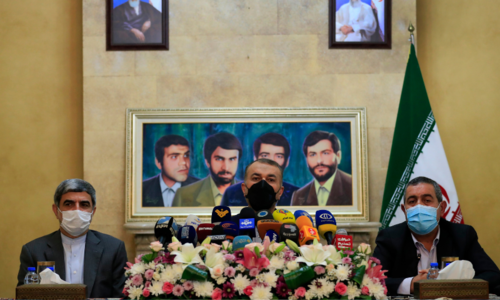WASHINGTON: The Biden administration said on Monday that diplomatic efforts to get Iran back to nuclear negotiations are at a critical place and that international patience with Iranian delays in returning to the talks is wearing thin.
The US special envoy for Iran, Robert Malley, told reporters there is a deep and growing concern about Iran’s continued intransigence and refusal to commit to a date to resume the negotiations in Vienna.
Malley said the US and its partners still want a diplomatic solution to bring both America and Iran back into compliance with the 2015 nuclear deal that former President Donald Trump withdrew from. But, he said they are considering alternatives to the diplomatic path, although a decision will be dependent on Iran’s actions.
Were in a critical place, he said, noting that the Vienna talks were suspended after a sixth round in June due to Iran’s elections and that new Iranian President Ebrahim Raisi has had plenty of time since taking office in August to decide on a policy.
At this point its hard to find an innocent explanation as to why its taking so long, Malley said. The Plan B being implemented right now appears to be the Iranian one, and that’s something we have to be prepared for.
His comments follow a series of high-level meetings in Washington, the Gulf and Europe about how to proceed in the effort to get Iran back to the table for serious discussions on how to limit its nuclear programme in exchange for sanctions relief.
Malley met on Friday with European officials in Paris after which France urged Iran to curb nuclear activities of unprecedented gravity. Those talks followed meetings he held with Gulf Arab states earlier last week.
Malley’s travels came after a series of high-level meetings in Washington between senior Biden administration officials and the foreign ministers of Israel, Saudi Arabia, the United Arab Emirates and the European Union’s diplomatic chief.
They have warned that Iran will face greater international isolation, new economic penalties and possibly military action if it does not return to the Vienna talks.
The consensus comes amid growing concerns that Tehran is not serious about returning to the negotiations. It also comes as the Biden administration, which had made rejoining the accord a priority in its first months in office, and others, have become increasingly pessimistic about the prospects for such negotiations even if they do resume.
Published in Dawn, October 26th, 2021














































